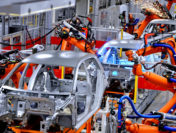In some industries, high energy use is almost completely unavoidable. The need for a constant, unerring supply of electricity and gas is pressing, especially in sectors as intense as manufacturing, retail and catering. It might be because of the need to produce high volumes of goods or down to the machinery used, but using a large amount of energy is necessary for many businesses.

In this day and age when environmental concerns are as pressing as they have ever been, companies of all sizes and sectors have been making an effort to reduce energy use and operate in a ‘green’ way. Businesses have invested in energy-efficient lighting, made savings with low energy machinery and processes and through staff behaviour change initiatives such as asking employees to switch off lights, computers and printers when they’re not in use.
An extra source?
Even if measures like the ones mentioned are taken by some businesses, they may not be enough to help significantly reduce the amount of energy used. Fortunately, to try and help provide an extra source of electricity when it’s needed the most, renewable energy may be the solution to this particular problem, but how can it be implemented?
Photovoltaic (PV) solar panels are among the best solutions to this problem. PV panels can be erected on frames, pitched and flat roofs and even on the ground, providing electricity during daylight hours. They’re at their most effective during the summer months, but will generate on even cloudy days and are handy in case of electricity shortages, which may happen during peak hours in a working day in the future.
Solar PV providers Dulas have worked on a number of solar and renewable energy projects on behalf of countless businesses in the UK, and are all too aware of the benefits solar panels have in terms of investment for a company.
“Ever-rising energy costs,” said a spokesperson from Dulas, “have a significant impact on business. As this is unlikely to change, the pressures on the commercial sector to contribute to our climate change goals will grow.
“A roof-mounted solar system will help future-proof your business against these threats.”
The recently-established ‘Feed-In Tariff’ is also available for business, meaning after a certain number of years a profit can be made from feeding excess energy into the grid.
Other alternatives
Solar power is arguably the most common form of renewable energy, but there are alternatives. The most common are:
- Wind power – this can be made possible for high energy users courtesy of a wind turbine. Farmers, landowners and rural businesses located in areas of reasonable wind speed would benefit most from it.
- Hydroelectric power – this harnesses the movement of a river to generate electricity, and is among the most reliable.
- Biomass – using pellets made from decomposed matter, wood chip or logs, biomass is a carbon neutral process ideal for high heat requirements or heating water. Catering firms, poultry and dairy farms, hotels and tourism businesses are among those most likely to need this, especially if they require a constant supply of hot water.
Photo credit: h080




